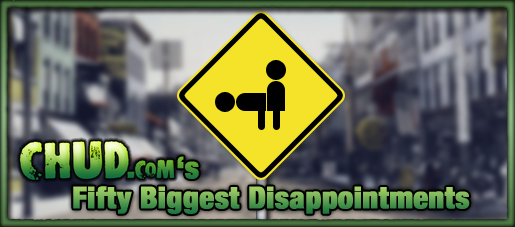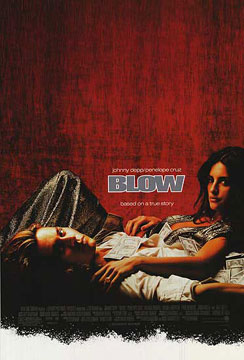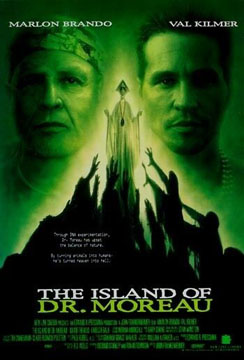
Welcome to the next CHUD List.
We’ve
tackled our essentials list and the continued revelation of our Kills
List from 2003, and now that we’ve begun the beguine, we must continue.
Behold:
The CHUD.com Top 50 Disappointments.
A
quick word on the criteria. We could very easily have spent this whole
article discussing sequels and prequels and adaptations of television
shows and called it a day. Instead, we tried to go a different route.
Also, from a master list of over 100, the involved parties (Devin,
Jeremy, Micah, Russ, and myself) all killed off a choice for each one
we claimed. As a result, we’ll run a big list at the end of this of the
‘ones that got away’. So, here is day one of many where we chronicle
the 50 Biggest Disappointments. Two a day, every week day for five
weeks. In no particular order:
 #6 – Blow (2001. dir. Ted Demme)
#6 – Blow (2001. dir. Ted Demme)
After
Scorsese’s Casino arrived to its own share of relative disappointment in
1995, there was a gaping hole left in the “charged crime biopic” lane that
Marty had carved out much to our collective delight. For anybody to even think
about stepping in those shoes and putting on that suit, they’d have to have a
rare combination of chops, vision, and talented actors to bring to the table.
In all fairness, Ted Demme was certainly up to the challenge when he made Blow
six years later. He had established himself as a top-notch workingman director,
able to turn out rock solid pictures rich with characterization and heart (Beautiful
Girls, The Ref). Now, it was his time to deliver a signature film that
would establish his name once and for all. In telling the story of the film –
the rise of cocaine in America through the eyes of one notorious mid-level
trafficker – he certainly wasn’t hurting in the vision department, and with the
film firmly planted atop the capable shoulders of Johnny Depp and a powerful
ensemble cast (Ray Liotta, Cliff Curtis, Franka Potente), acting wouldn’t be a
problem. There was one secret ingredient to the Scorsese formula, however, that
Demme definitely never got a handle on, and that is while ace filmmaking and
vivid performances can make a good film great, there’s little to nothing that
one can do to make a dull man’s story fascinating.
Although
Blow
has more than a few flaws, its chief one, much less cited than Demme’s
blatant co-opting of Scorsese’s crime biopic style for his own, is that the
Depp’s George Jung is about as conventional and one-note a character as you can
get. It’s through no fault of Depp’s, bringing his A-game with a nicely
restrained Boston accent (see Kevin Costner in Thirteen Days for ample
proof of how badly this can go) and an appropriately quiet demeanor to a bland
role that many actors would be tempted to ham up over the course of the film’s
two-hour running time. Instead, the blame has to lie with Demme for giving us a glimpse into the equivalent of a championship game starring a legend (Pablo
Escobar) and then sticking us with the shittiest tickets and worst vantage
point possible. Through the film’s events and his voiceover narration, we can
clearly see that Boston George himself is nothing more than a bemused observer
who happened to chance upon a connection to Escobar, thereby giving him first
crack at giving rappers’ current favorite product a stranglehold here in America.
Thus, we’re stuck with a slacker of a narrator while more potent characters
like his “friend” Diego and Escobar go about their infinitely more interesting
lives. When they’re not onscreen, you can feel the air leaking out the film. There’s
a well-worn rise-and-fall, three-act template that the movie follows, but with
Jung having such crappy taste in confederates and lovers, the “fall” portion of
that equation, brought on by a myriad of telegraphed betrayals, just isn’t
worth the time or effort. The final bum notes come from scenes of George
struggling through dysfunctional relationships with his conflicted parents and,
finally, his neglected daughter. Because Demme builds his drug opera to climax
with the resolutions to these domestic struggles, he essentially wants to wash
away the grimy, guilty pleasure of the previous 90 minutes with a final reel of
weepy melodrama meant to somehow redeem George as an unlucky, but still
worthwhile dad/son. But we know it’s a too-little/too-late lie, and Demme’s inability
to reconcile these disparate parts of his life show that that while he loved
Marty’s films, he apparently misunderstood them and why they worked.
It’s
become trite to simply dismiss Blow as nothing more than Diet-Scorsese,
but it’s also inaccurate. That would imply that he rendered a lighter, yet
faithful version of the Goodfellas formula when he actually
fundamentally changed it for the worse. A much better analog would be New Coke.
– Micah
Travesty Scale (1-10): 5 out of 10
 #5 – The
#5 – The
The most
popular topic on message boards about the state of the film industry is the
prevalence of remakes. ‘Why, oh why can’t they just come up with good stories?’,
we all whine. The simple truth is that
you think John Huston was the first to take a crack at The Maltese Falcon? – and
sometimes the remake can be quite relevant, by spinning a familiar story
according to the prevailing attitudes of the day.
Other
times, however, the remake becomes a near-apocalyptic mess. And still further,
there’s The Island of Dr. Moreau, which is to the apocalypse what a
rotting abscess is to a mosquito bite.
Just look
at that cast. Kilmer. Brando. Thewlis. Temuera Morrison. Hell, Hootkins and
Dacascos! All in the service of fun monster make-up and genetic experiments. With
off-kilter South African filmmaker Richard
helm, this could have been so much fun.
And
while, at this point, there was little reason to defend Richard Stanley as some
great auteur, at least he was interesting. Hardware was a fun, flawed movie and
the recent DVD of Dust Devil at long last proves it to be a solid, intriguing
genre offering. I love Kilmer and at this point was willing to give Brando the
benefit of the doubt, but the real reason I wanted to see Moreau was Richard
Stanley.
Then came
the fights.
Followed by Frankenheimer, who couldn’t keep a handle on his bored cast.
So Brando
wore a champagne bucket on his head.
Call it
high (unintentional) comedy. Call it a tribute to the self-indulgence of stars
and the cowardice of a studio unable to manage its investment. You can even
call it a good excuse for covering your face in Gold Bond powder as a cheap
last-minute Halloween costume. But beyond whatever sort of willful interpretation
you want to offer, at the end of the day Moreau is a turgid, stinking carcass of a once vibrant idea. And you thought they smelled bad on the outside!
I feel
almost bad that this is the second Frankenheimer film on the list, but this is
only partially his fault. In fact, I almost passed on titling this entry after
the film – I was really tempted to just call it Brando’s Last Decade. You can
call Don
Juan DeMarco watchable and even entertaining, but there’s very little
justification for this, The Brave or The Score. Especially The
Score. (That’s a surefire Disappointments Addendum right there.) But if
I’d done that, this would have to be a ranked list, with the end of Brando’s
career sitting at number one. We’ve seen the mighty fall before and since
(Welles, DeNiro, et al) but none hit the ground with such a dull, awful thud as
Brando. It’s movies like these that actually made me glad to hear he’d passed
on.
Travesty Scale (1-10): 9 out of 10
Previously Disappointing:
- The Ladykillers
- Once Upon a Time in Mexico
- Bram Stoker’s Dracula
- Ultraviolet
- New York, New York
- Billy Bathgate
- Star Trek: The Motion Picture
- Willow
- Superman Returns
- Blade: Trinity
- Art School Confidential
- Lifeforce
- Bonfire of the Vanities
- Exorcist: Dominion
- The Black Hole
- Harlem Nights
- The Last Castle
- Ghostbusters II
- Love on the Run
- Full Frontal
- Celebrity
- Alien Resurrection
- Dune
- From Hell
- Hook
- The Replacement Killers
- Godzilla (1998)
- Tideland
- Dogma
- Reindeer Games
- Rosewood
- The Good German
- World Trade Center
- The Cotton Club
- Mission: Impossible II
- A Life Less Ordinary
- The Two Jakes
- Cleopatra
- Me, Myself, and Irene
- Wag the Dog
- Cabin Fever
- House of 1000 Corpses
- Hero (1992)
- Planet of the Apes (2001)
Official Message Board Discussion.